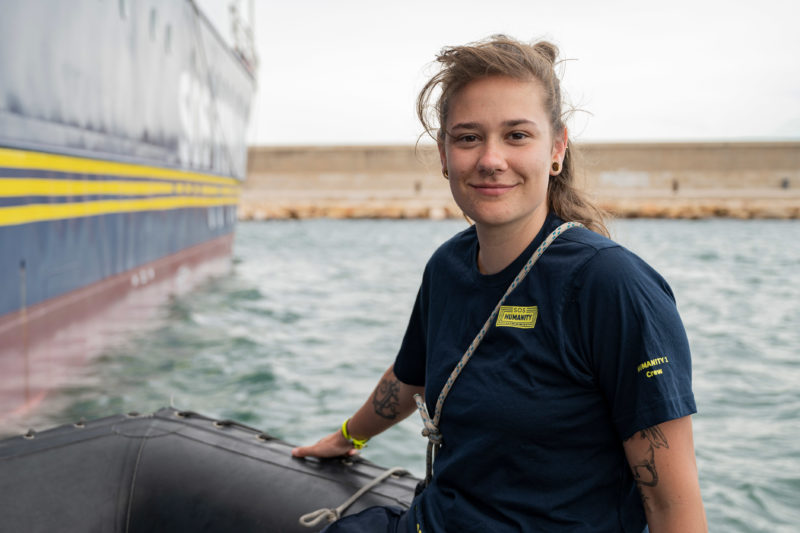MeetTheTeam: Nina, RHIB-Coordinator

On our first mission with Humanity 1, Nina is going on board as part of the search and rescue crew. We spoke to her and are happy to introduce her as one of the first crew members of the Humanity 1! #MeetTheTeam
Nina is from around Zurich (Switzerland) and has been supporting refugees since 2016: First as a volunteer ashore – in Greek refugee camps or on the Greek coast – later at sea as a crew member of various civil sea rescue organisations. Since 2019, Nina has been studying law and supports women affected by violence as a volunteer legal advisor at the Refugee Law Clinic.
Nina, great to have you on board! Because you have a lot of things to do, we will start with the first question immediately.
“What is your position on board?”
“I am the RHIB coordinator. In this position I coordinate the search and rescue team in one of the two fast rescue boats (RHIB) during training and operations, thereby keeping contact with the bridge and the search-and-rescue coordinator (SarCo).
Part of my work is to support the SarCo during our missions. Together we organise the so-called shuttle. During rescue operations, people are usually brought on board the Humanity 1 in several small groups, one after the other. The RHIB coordinator and SarCo inform the teams waiting there about the condition and number of people so that they can be prepared for situations such as medical emergencies.”
“The entire maritime sector is (still) very male-dominated. We also notice this with our crew. What are your experiences as a crew member and what advice would you give us to get more women* on board?”
“My experiences are very ambivalent. On the one hand, there is the expectation of having to “prove” oneself in the respective role. This consumes energy that is then lacking in the actual work. At the same time, women* in the field are quickly put on a pedestal and treated as a special case or exception. This is an extreme exaggeration and does more harm than good. It implies that as a woman* you must be special to be able to be active in the field of seafaring/sea rescue at all. However, my gender has nothing to do with my work or performance.
Just because I work for an NGO does not mean that there are no sexism or stereotypes. But I also see that especially the search-and- rescue NGOs are making a lot of effort to tackle this fundamental social problem by supporting women* and recruiting them specifically for their missions. It is important to most NGOs to pay attention to gender equality in the teams and not to just treat this as a side issue.
It is very difficult to know how we can motivate more women* to apply and work with us. After all, we are at the receiving end of a very complex system that has disadvantaged women* for years and hamper their development. Genereally, there are few women* in the maritime industry. And this very male environment certainly also leads women* to not even think about applying for a crew position on a civil rescue ship.
It is important to tell women* that they should not underestimate themselves: Your skills are urgently needed!
A balanced crew is important for the coexistence of the crew on board. Rescued women* have also told me how relieving it was for them that their first contact was with a woman*. This helped them to understand that they do not have to be afraid of us and that they will be safe.”
“What does humanity mean to you?”
“Humanity means to not look away and to not take situations, events, or developments as fixed. Especially as a very privileged person, every non-action is also always an omission.”
***
Photo credits: Arez Ghaderi / SOS Humanity